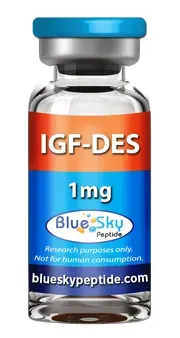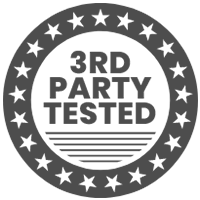45% Off Everything*
Save Now!!

Availability: In stock

| Unit Size | 1 mg/vial |
| Unit Quantity | 1 vial |
| Purity (Mass Spectrometry and UV) | 99.2% |
| pH | 7.08 |
| Bacterial Endotoxins | <2EU/mg |
| Molecular Mass | 7360.50 |
| Appearance | Lyophilized White Powder |
| Source | Recombinant Synthesis |
| Storage |
Lyophilized IGF-1 DES 1-3 is Stable at room Temperature for 90 days, however it is best to store in a freezer below - 8c for any extended period of time. After reconstitution IGF-1 DES 1-3 should be refrigerated at temperatures not to exceed 35 F. |
| Terms | The products we offer are intended for laboratory research use only. Please familiarize yourself with our terms of service prior to ordering. |
Click here to read more about IGF-1 DES on our research blog
IGF-1 DES 1,3 is a synthetic peptide of insulin-like growth factor 1 (IGF-1) made through recombinant synthesis. IGF-1 DES 1,3 lacks 3 amino acids from the N-terminus of the peptide (Gly-Pro-Glu). This creates a peptide consisting of only 67 amino acids, compared to the 70 amino acids of IGF-1. IGF-1 DES 1,3 is also a naturally-occurring splice variant found in the human brain and animal models1 The shortened peptide variant has the additional benefit of being 10 times more potent than endogenous IGF-1. This is because IGF-1 DES 1,3 does not bind as effectively to insulin-like growth factor-binding proteins (IGFBPs), which significantly enhances its bioavailability. This trait makes IGF-1 DES 1,3 a desirable peptide to use in in vitro and in vivo studies for addressing conditions involving IGF-1. IGF-1 DES 1,3 has been studied in many different settings, including investing its effects in neurological disorders, as well as modulating the immune system. IGF-1 has long been known to play a role in neuronal health and survival, particularly in maintaining mature synapses. Researchers hypothesize that analogs of IGF-1 may be beneficial in improving autism deficits, in addition to improving cognition and memory in aging people.2,3,4 IGF-1 DES 1,3 can also improve immune system function by enhancing mononuclear cell and neutrophil function.5 The peptide may promote wound and skin healing as well by bypassing inflammatory pathways that interfere with normal IGF-1 function. Since IGF-1 DES 1,3 does not bind well to IGFBPs, it is available in inflammatory environments to stimulate fibroblast growth, leading to accelerated wound healing.6
IGF-1 DES 1,3 is available as a white lyophilized powder at a concentration of 1 mg/vial. This product is intended for laboratory research purposes only.
References: 1. Ballard FJ, WAllace JC, Francis GL, et al. Des(1-3)IGF-I: a truncated form of insulin-like growth factor-I. Int J Biochem Cell Biol. 1996;28(10):1085-7. 2. Steinmetz AB, Stern SA, Kohtz AS, et al. Insulin-Like Growth Factor II Targets the mTOR Pathway to Reverse Autism-Like Phenotypes in Mice. J Neurosci. 2018;38(4):1015-1029. 3. Ramsey MM, Adams MM, Ariwodola OJ, et al. Functional characterization of des-IGF-1 action in excitatory synapses in the CA1 region of rat hippocampus. J Neurophysiol. 2005;94(1):247-54. 4. Gorecki DC, Beresewicz M, Zablocka B. Neuroprotective effects of short peptides derived from the Insulin-like growth factor 1. Neurochem Int. 2007;51(8):451-8. 5. Zhao X, McBride BW, Trouten-Radford LM, Burton JH. Effects of insulin-like growth factor-I and its analogues on bovine hydrogen peroxide release by neutrophils and blastogenesis by mononuclear cells. J Endocrinol. 1993;139(2):259-65. 6. Yateman ME, Claffey DC, Hughes SCC, et al. Cytokines modulate the sensitivity of human fibroblasts to stimulation with insulin-like growth factor-I (IGF-I) by altering endogenous IGF-binding protein production. J Endocrinol. 1993;137(1):151-9.